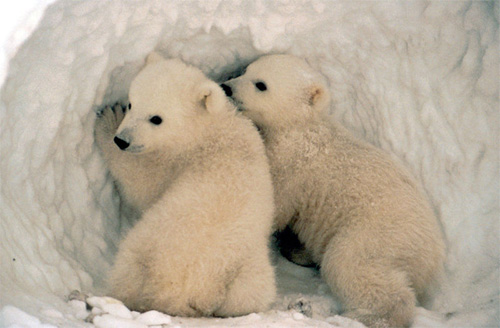 When you think of climate change and animals, what do you think of? Birds? Butterflies? Maybe if you’re a biologist. But most people think of… yes, you guessed it, polar bears. These bears have become the unwitting symbol of climate change, as the first mammals to ever become endangered because of it. But just because polar bears are the poster children (a cliché, if you will) for disaster, it doesn’t mean we shouldn’t be concerned.
When you think of climate change and animals, what do you think of? Birds? Butterflies? Maybe if you’re a biologist. But most people think of… yes, you guessed it, polar bears. These bears have become the unwitting symbol of climate change, as the first mammals to ever become endangered because of it. But just because polar bears are the poster children (a cliché, if you will) for disaster, it doesn’t mean we shouldn’t be concerned.
Most people know that polar bears are threatened by habitat loss and decreased access to prey. Summer arctic ice has been greatly reduced over the past 25 years and is staying melted for longer periods of time. So how does the amount of summer sea ice affect polar bears? As you probably already know, polar bears hunt seals on sea ice. So less ice means fewer seals hanging around, which means less food to nibble on. When the ice melts in the summer normally, it becomes harder to find food—but with a vast decrease in summer sea ice due to climate change, it becomes nearly impossible.
It was originally thought that this wasn’t a problem for the bears, because they go into something called a “walking hibernation” when deprived of food. Though the term “walking hibernation” sounds like a bunch of polar bears wandering around like zombies, it is really more of an “energy-saving mode” that allows the bears to survive longer summers with little food. But researchers have found that the bears are not really going into an energy-saving mode at all, and therefore are not as equipped to deal with climate change.
In a recent study published in Science magazine, biologist John P. Whiteman and his team of researchers monitored the core temperatures of polar bears in the Beaufort Sea over the course of a few years. They found that the bears’ body temperatures dropped just slightly during the summer, as did their levels of activity. This was not because the bears were conserving energy in a state of walking hibernation, but because they were outright starving! The team found that the bears maintained the same need for food and that their metabolisms barely slowed down at all. This is bad news for the bears, who unlike the rest of us, really aren’t concerned about slimming down their summer beach bods. In addition, though this region is not highly populated (with people), the few that are living there must be a little concerned about starving polar bears wandering around.
Yes, the polar bear has become a climate change cliché, but there is a reason why and the latest research is just more bad news. The polar bear’s decline in population is a signal to the world that our activities as humans can have disastrous impacts on wildlife. Sadly, if we don’t change our behavior, it’s the polar bears, not us, who will be the first to go.
Nikita Daryanani is a summer intern at NCSE. She recently graduated from UC Davis with a degree in Environmental Policy Analysis and Planning, and is interested in global climate change and environmental justice.
Image from beingmyself from Flickr
